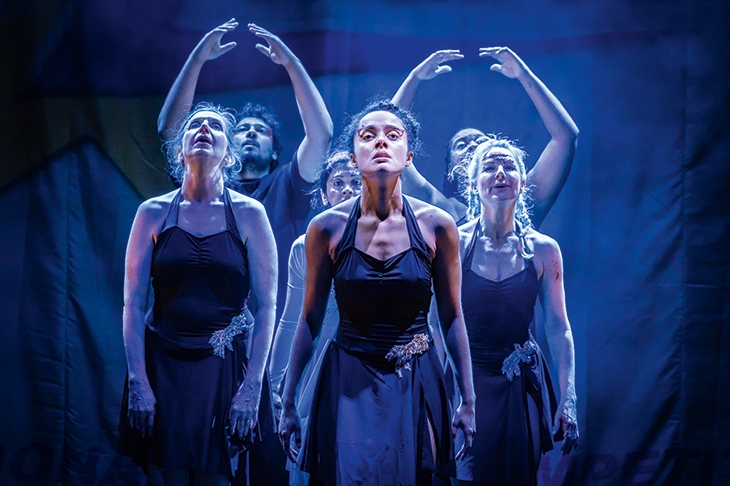Hampstead’s boss Ed Hall was so impressed by Stephen Karam’s play The Humans that he wanted to direct it himself. Instead, thanks to a stunning series of accidents, he was able to bring the original Tony award-winning production from Broadway to London. And here it is, directed by Joe Mantello.
It’s a family drama, which opens with Dad and Mom, in their sixties, arriving for Thanksgiving at a dingy New York apartment occupied by their daughter Brigid and her fiancé Richard. All the characters are heavily scarred by life. Richard, aged 38, hasn’t yet completed his sociology degree because he suffers from severe depression (possibly triggered by his subject choice, although the writer isn’t cynical enough to make such a cheap crack). Brigid is a dole cheat who moonlights as a waitress and harbours an impossible dream of becoming an orchestral composer. Her sister Aimee is a jilted lesbian with Crohn’s disease whose sick-leave absences are about to terminate her career. Dad has cashflow problems after a botched property deal. And Mom is a podgy drudge who gives round-the-clock care to ‘Momo’, a granny-on-wheels with Alzheimer’s, whose susceptibility to hysterical fits provides an element of unpredictable combustibility. What redeems these losers is the deep bond of love between them.
The play is fun to watch as they jabber away, affectionately mocking each other’s shortcomings. Best moment: Dad takes a pop at mopey Brigid for eating superfoods. ‘If you’re so depressed why do you want to live longer?’ But the play’s negativity and pessimism seem contrived. Has nobody told these self-pitying duffers that simply living in Manhattan is a stroke of colossal good fortune? The play’s portentous title suggests that the writer has an important message that we earthlings should heed with gratitude and humility. And the message is that the only destinies available to modern Americans are unemployment, sickness, bankruptcy, infidelity, jail, despair and death. Perhaps the producers should tape a cyanide pill to the sleeve of the programme.
At the climax of the second half a character makes a Big Confession, which feels very stagey. Had this revelation come earlier, the play would have benefited from more internal tensions and the playwright might have managed without the device of the demented granny to create surprises at random moments. (By the way, the gaga gran is a dreadful role to give an experienced actress. The Arts Council should introduce a cap on dementia-affected female parts in subsidised theatres.) The play ends with a long and symbolic scene in which a character staggers around in the dark sobbing noisily while fumbling with a broken lamp. That’s pushing it too far. An American crying over a light bulb? Neil and Buzz would be ashamed. The play will gratify those with a taste for sentimental family soap operas but it reminded me of Noël Coward’s response to Death of a Salesman: ‘A celebration of mediocrity’.
The confusingly titled Dance Nation sounds like a movie or a nightclub but it’s a drama about American ballet competitions. All the expected details are here: a pushy mom, a camp dance teacher and a troupe of bickering 13-year-old divas. The dance teacher creates a pretentious show celebrating the life of Gandhi. The girl he casts in the lead role disappoints him so he creates a new part, the Spirit of Gandhi, to conceal his error and to improve the piece. The girls playing Gandhi and the Spirit become enemies but are compelled to treat each other with decency and affection because they’re involved in a joint enterprise.
This simple idea generates a wonderful piece of drama. The dialogue of the 13-year-olds — awkward, tender, respectful and yet sprinkled with unconscious malice — had me sighing with admiration. It felt more like overheard conversation than professionally crafted rhetoric. Aside from their rehearsals, the girls are preoccupied with boys, penises, marriage, sex, and with developments of their bodies that they explore in the bathroom using mirrors and probes. The frankness of these descriptions is eye-watering and sometimes needlessly coarse.
The show’s director, Bijan Sheibani, has wisely cast adults to play the young teenagers and this spares us the discomfort of watching 13-year-olds exchanging semi-pornographic speeches. Parents of teenage girls might consider this show as a family outing. Be warned. You’ll find yourselves and your daughters squirming with embarrassment. Send the girls alone. There are some great performances here. Miranda Foster is brilliant as the furious and embittered mother. Karla Crome communicates the guileless simplicity of Amina, the star ballerina. And Ria Zmitrowicz, a performer of exceptional versatility, captures the confused frustrations of her rival and manages to give her ballet technique a flavour of inadequacy. She dances to a very high level while also signalling that she lacks the sincerity and excellence of the true star.







Comments